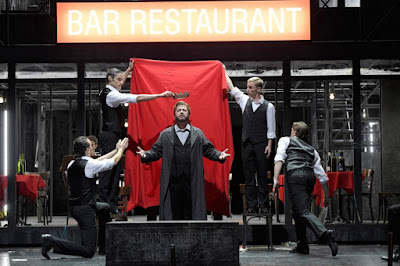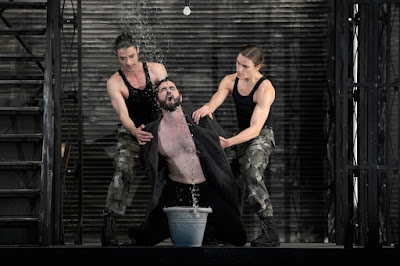 |
| Meyerbeer: Le prophète - Deutsche Oper Berlin(Photo Bettina Stöß) |
Reviewed by Tony Cooper on Nov 26 2017 Star rating:
This production of Meyerbeer’s gargantuan opera, Le prophète, has been carefully cast, thoughtfully directed and wonderfully sung
 |
| Meyerbeer: Le prophète - Gregory Kunde as Jean Deutsche Oper Berlin(Photo Bettina Stöß) |
A grand opera in five acts, Le prophète, directed by Olivier Py, the renowned French director and current incumbent of Festival d’Avignon and conducted by Enrique Mazzola, music director of the Orchestre National d’Ile de France, was performed at the Deutsche Oper Berlin on 26 November 2017, with Gregory Kunde as Jean de Leyden, Clémentine Margaine as Fides, Elena Tsallagova as Berthe, Derek Welton as Zaccarias, Andrew Dickinson as Jonas, Noel Bouley as Mathisen and Seth Carico as Count Oberthal. The opera charts the rise and fall of the rebellious Protestant Anabaptists who tried to establish a communal sectarian government in the Westphalian city of Münster at the time of the Reformation.
The city, in fact, came under their direct rule from February 1534 - when the city-hall was seized and Bernhard Knipperdolling installed as mayor - until its fall in June 1535. It was Melchior Hoffman, who initiated adult baptism in Strasbourg in 1530, and his line of eschatological Anabaptism, that helped lay the foundations for the dramatic events in Münster, one of the bloodiest chapters in the history of the Reformation.
 |
| Meyerbeer: Le prophète - Seth Carico as Count Oberthal Deutsche Oper Berlin(Photo Bettina Stöß) |
But, sadly, his style fell out of favour and Le prophète fell completely out of favour in the early part of the 20th century but slowly recovered its status with revivals at Zürich Opera in 1962 and, indeed, Deutsche Oper Berlin in 1966 (both featuring Sandra Warfield and James McCracken in the leading roles) while a revival at The Met in 1977 starred Marilyn Horne as Fidès.
Vienna State Opera also brought it to the stage in 1998 in a production directed by Hans Neuenfels with Plácido Domingo and Agnes Baltsa. Gladly, over the past few years, Le prophète is finding its feet once more in European houses.
Sung in French to a libretto by Eugène Scribe and Émile Deschamps after passages from the Essay on the Manners and Spirit of Nations by Voltaire, the scenario of Le prophète - which, by the way, has lost none of its political relevance in the present century reference, for instance, the Catalan fracas in Spain and the current upheaval in Zimbabwe - surrounds the real-life protagonist and the self-proclaimed ‘King of Münster’ and 16th-century Anabaptist leader, Jean de Leyden, who leads a band of fundamentalists in an act of defiance against the despotic Catholic authorities but soon realises that the revolutionaries are as corrupt as the rulers they have displaced.
 |
| Elena Tsallagova as Berthe, Clémentine Margaine as Fidès (Photo Bettina Stöß) |
It’s a hell of a work, too, for singers to master and American tenor, Gregory Kunde - an exciting singer with a richly-textured voice making his role début as Jean de Leyden - put in a commanding and exhilarating performance in such a strenuous and demanding part as, too, did the Russian soprano, Elena Tsallagova, as his lover, Berthe. But in true 19th-century operatic style she’s coveted by another - in this case Count Oberthal, ruler of Dordrecht, sung (and acted) in a suave, authoritative and arrogant manner by Berlin-based bass-baritone, Seth Carico.
French mezzo-soprano, Clémentine Margaine - based at Deutsche Oper Berlin originally as a stipendiary and later as a member of the ensemble from 2011 to 2014 - made her role début, too, as Fidès and thoroughly stamped her credentials on what was another strenuous and demanding part. She harbours such a wonderful and distinctive voice that I found it simply adorable radiating round the vastness of Deutsche Oper’s large (and comfortable) auditorium with consummate ease.
Overall, the opera was well cast and extremely well sung and one scene that I gladly take away with me and one that I found totally and thoroughly absorbing featured Clémentine Margaine and Elena Tsallagova in the duet in act II - ‘Pour garder à, ton film le serment’ - concerning the fate of Jean and his whereabouts. Passionately and convincingly sung it gave way to a thrilling trio in the same act - ‘Loin de la ville’- with both singers joining Gregory Kunde as they dreamed of bliss and happiness and their future life together. But dreams never come true - especially in 19th-century opera.
 |
| Meyerbeer: Le prophète - Deutsche Oper Berlin(Photo Bettina Stöß) |
 |
| Andrew Dickinson as Jonas, Seth Carico as Count Oberthal, Derek Welton as Zacharias (Photo Bettina Stöß) |
The Coronation ends spectacularly with a large crowd assembled heaping praises on the ‘Prophet’ (in this production seen healing the blind and the wheelchair disabled) at the miracles he has accomplished while bizarrely acclaiming him to be the Son of God.
What a scene! What a staging! It was 19th-century operatic grandeur in every sense of the word with the vastness of the Deutsche Oper stage taken up by one of the largest choruses I’ve ever encountered (over 80 strong) and that’s without taking in account the children’s chorus. And talking of musical strength the orchestra numbered just over 120 - and that’s large by no stretch of the imagination. Under the baton of Enrique Mazzola they played brilliantly and captured in more ways than one the essence and splendour of Meyerbeer’s exciting score.
But in such a serious opera as this comedy found its place, too, with the trio in act III, notable for the original way in which a grave situation is set by Meyerbeer complemented by a comic situation, focuses on Count Oberthal arriving under the cover of darkness to the Anabaptist camp hoping to infiltrate their group and disrupt their plans.
 |
| Gregory Kunde as Jean, Derek Welton as Zacharias (Photo Bettina Stöß) |
More often than not ballet proved a popular divertissement in 19th-century opera and in the first scene of act III, the ballet music of Les Patineurs is featured in which the dancers mimic ice-skaters. But in this production it was different as the dancers were seen on a massive revolving stage engaged in some telling and imaginative choreography, created by Olivier Py, centred round a war-torn high-rise block of flats. Matthew Bourne, I’m sure, would have been impressed.
Incidentally, the English composer, Constant Lambert, took the ballet music from Le prophète with excerpts from the ballet music of Meyerbeer’s opéra comique, L’étoile du nord, to successfully create Les Patineurs for The Royal Ballet in 1937 choreographed by Sir Frederick Ashton.
What also made this opera so absorbing and interesting was the modernistic setting. The director dumped the traditional framework of farmsteads, windmills and so forth turning the peasants into white- and blue-collar workers, the occupants of the high-rise flats. Sporting Trilby hats, the men looked smart dressed in two-piece suits and ties while the women were turned out in nicely-patterned day-to-day dresses created by costume designer, Pierre-André Weitz, who also engineered some rather imaginative and detailed sets especially the scene incorporating the Bacchanalian feast in act V while Bertrand Killy’s excellent lighting effects fitted well the overall stage picture.
 |
| Meyerbeer: Le prophète - Deutsche Oper Berlin(Photo Bettina Stöß) |
The musical and theatrical influences of Le prophète - so much admired by Berlioz who attended its Paris première - are enormous and relate not only to Liszt’s monumental Fantasy and Fugue on the chorale ‘Ad nos, ad salutarem undam’ for organ, based on the Anabaptists' hymn and, indeed, dedicated to Meyerbeer, but also the duet between mother and lost child in Verdi’s Il trovatore. And the final of Le prophète - culminating in fire, destruction and death - closely mirrors the catastrophic finale of Wagner’s Götterdämmerung.
In fact, the tremendous success of Le prophète also provoked a massive anti-Jewish attack on Meyerbeer by Wagner who in his essay Das Judenthum in der Musik attacks Jews in general targeting not only Meyerbeer but Mendelssohn as well. It was published under a pseudonym in the Neue Zeitschrift für Musik of Leipzig in September 1850 and reissued in a greatly expanded version under Wagner’s name in 1869. It is regarded by many as an important landmark in the history of German anti-Semitism.
The production was a very serious and, indeed, grand affair with no expense spared but to get such a large production like this to the stage (which was exciting to the core) doesn’t come cheap therefore the German government stepped in with monies set aside by the Bundestag to mark 500 years of The Reformation. It’s a landmark (and special) year for Germany and this production of Le prophète will proudly takes in place in its history.
 |
| Meyerbeer: Le prophète - Deutsche Oper Berlin(Photo Bettina Stöß) |
Giacomo Meyerbeer (1791-1864): Le prophète
World première: 16 February 1849 (Opéra de Paris)
Première of Deutsche Oper Berlin’s revised version (26 November 2017) is based on the history of the opera’s development
Director: Olivier Py
Conductor: Enrique Mazzola
Set and costume designer: Pierre-André Weitz
Lighting designer: Bertrand Killy
Dramaturge: Jörg Königsdorf / Katharina Duda
Jean de Leyden: Gregory Kunde
Fidès: Clémentine Margaine
Berthe: Elena Tsallagova
Zaccharias: Derek Welton
Jonas: Andrew Dickinson
Mathisen: Noel Bouley
Count Oberthal: Seth Carico
1st Farmer: Sandra Hamaoui
2nd Farmer: Davia Bouley
1st Farmer / 1st Anabaptist / 1st Citizen / Soldier: Ya-Chung Huang
2nd Farmer / 2nd Anabaptist: Taras Berezhansky
2nd Citizen / Officer: Jörg Schörner
3rd Citizen: Dean Murphy
4th Citizen: Byung Gil Kim
Chor der Deutschen Oper Berlin (chorus-master: Jeremy Bines)
Kinderchor der Deutschen Oper Berlin (chorus-master: Christian Lindhorst)
Orchester der Deutschen Oper Berlin
Opernballett der Deutschen Oper Berlin
Elsewhere on this blog:
- Teenage Mozart: Classical Opera's stylish account of Il sogno di Scipione - CD review
- Gargantuan: Mahler's Symphony No. 3 in Berlin - concert review
- Revolting rhymes & marvellous music: The Magnard Ensemble in Roald Dahl & Paul Patterson - Cd review
- Generously lyrical: A Houseman Dichterliebe from Gareth Brynmor John, Nigel Foster and Gabriel Woolf - concert review
- The man behind the music of War Horse: I chat to composer Adrian Sutton - interview
- Divine consolations: Stile Antico in Schütz and Bach - concert review
- Historical importance: Alamire in new Thomas Tallis discoveries - CD review
- Composers selection: Penderecki conducts Penderecki - CD review
- Audience participation & great fun: Schools version of Hansel & Gretel - music education
- Afluencias: Contemporary music from Brazil - CD review
- Home







%20as%20Leporello%20and%20Erik%20Tofte%20(back%20to%20camera%20in%20garnet%20shirt)%20as%20Giovanni%20-%20Don%20Giovanni.jpg)



No comments:
Post a Comment